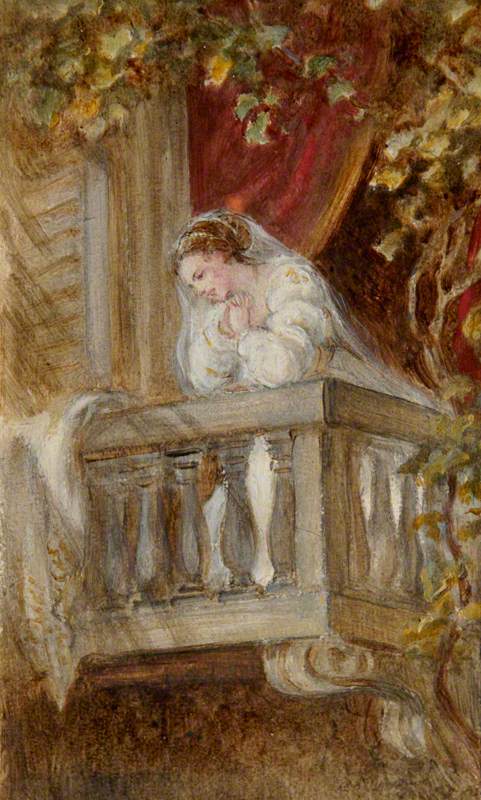Monday, January 15, 2024
There is a particularly pernicious trap awaiting actresses cast as Juliet. A similar trap awaits Lady Macbeth, though of a different nature, as well as several of the more archetypal male roles. But none of them are as insidious as The Juliet Trap.
Here’s how it happens. The good director casts a young woman who auditions with great energy, perfect comedic timing, and no fear of looking bad or awkward. She’s so beautiful that it will be awkward—Juliet is just on the cusp of fourteen years old, after all.
The actress is thrilled. Juliet is ‘one of those roles’, an ideal role, an iconic role, a dream role.
And that’s where the trap begins to close.
As a society, we all share a collective idea of what Juliet is supposed to be. We envision the party, the balcony, the potion, the tomb. We have this idealized image of youthful, romantic love.
The trouble is, that’s not Juliet. At least, not the one Shakespeare gives us. On the page, Juliet is willful, witty, and clever. Her only flaw is youth, a lack of experience that makes every moment the most important one in her life. She is, in short, a teenager.
Far too often, no matter how gifted and skilled the actress may be, she stops playing the words on the page. Instead, she tries to play the archetype, the ideal version of youthful love.
Which quickly reduces to playing ‘pretty’.
The trouble, of course, is that ‘pretty’ is not an active choice. It’s not even a character trait. It’s external. It can be achieved with costume and make-up, which all too quickly become the focus.
If you’re lucky, the actress only starts speaking softly, with a lilt in her voice and a flip to her hair. You know—‘prettily’. A good director can nip those in the bud from the jump.
If you’re unlucky, she actively tries to be ‘pretty’, and instead comes off as vain, vapid, and shallow. Exactly the opposite of what Juliet should be. She is not a Bianca. She is a Viola. (Though the common miscasting of Viola is a whole other conversation for another day).
What lifts the best Juliets from the ranks of the average is losing the fetters of ‘prettiness’ and embracing the comedienne within. Allow her to have awkward teenage moments. Make that first kiss with Romeo an actual first kiss, where they bonk noses. Allow her to prattle and be mortified during the Balcony Scene. Let her be, not gracefully in love, but ridiculously in love with Romeo.
Because in her exuberant inexperience, we will all recognize our own wonderfully terrible first loves. After all, she is the character we follow in the second half of the play, when things go downhill fast. If we identify with her joy early on, we will suffer all the more as she suffers. Because she will have been made, not ideal, but all too real.
So to all the Juliets out there, remember—play the words on the page. They are so much better than the idealized character in your head.
? ? ?
Speaking of idealizing Juliet, I am perplexed by a strange modern phenomenon: the ‘Letters To Juliet’ world.
I know there are desperate people out there, seeking advice on how to live their lives. Dear Abby, Oprah, and Mr. Blue (oh, how I do miss Mr. Blue!) are only a few examples of how authority figures have hundreds, nay, thousands of people seeking their counsel. I have absolutely no issue with this. Everybody needs advice sometimes, and Agony Aunts have been around for centuries now. The current form is Reddit, and the wonders of Am I The Asshole, which leaves my wife and I saying, “People don’t do such things.”
However, where you turn for advice matters.
In her 20s, my wife worked a summer as a receptionist at a television station. Her job was to cull the real calls from the crazies. She was confused by that job description until she fielded a call on her first day from a woman who had burned her hand and wanted to talk to Dr. Quinn, Medicine Woman for help.
I suppose I have less of a problem with asking for a fictional character than with the choice of fictional character—wouldn’t she rather talk to Dr. Ross or Dr. Carter? Or even the guys from M*A*S*H*? Someone with a passing knowledge of modern medicine at least? (Not to knock Dr. Quinn—I’ve met Jane Seymour and she’s absolutely lovely. But seriously!)
This, in a roundabout way, brings us to the topic of people writing letters to Juliet. It’s been happening for several hundred years. The lovelorn, for the most part, writing to her for help. Two authors compiled a book of letters written to Juliet in Verona, and the answers sent by the club set up just for that purpose. This was the book LETTERS TO JULIET, which spawned the film of the same name. Again, kudos.
What I cannot for the life of me fathom is this—why are these people writing to Juliet? Why go to her of all people for help?
There are three distinct problems with their choice of advisor, which I will list in ascending order:
1—She is a fictional character.
2—She’s a dead fictional character.
3—Seeing as she’s dead because of her love life, why would anyone want her advice in the first place? Her love affair didn’t go so well.
Thus my frustration with people not thinking through their need for a guide in life. I have less trouble with Linus writing to the Great Pumpkin than I do with people writing to a fictional dead fourteen-year-old.

Painting by Laura Wilson Barker. Dame Ellen Terry as Juliet in the Balcony Scene.